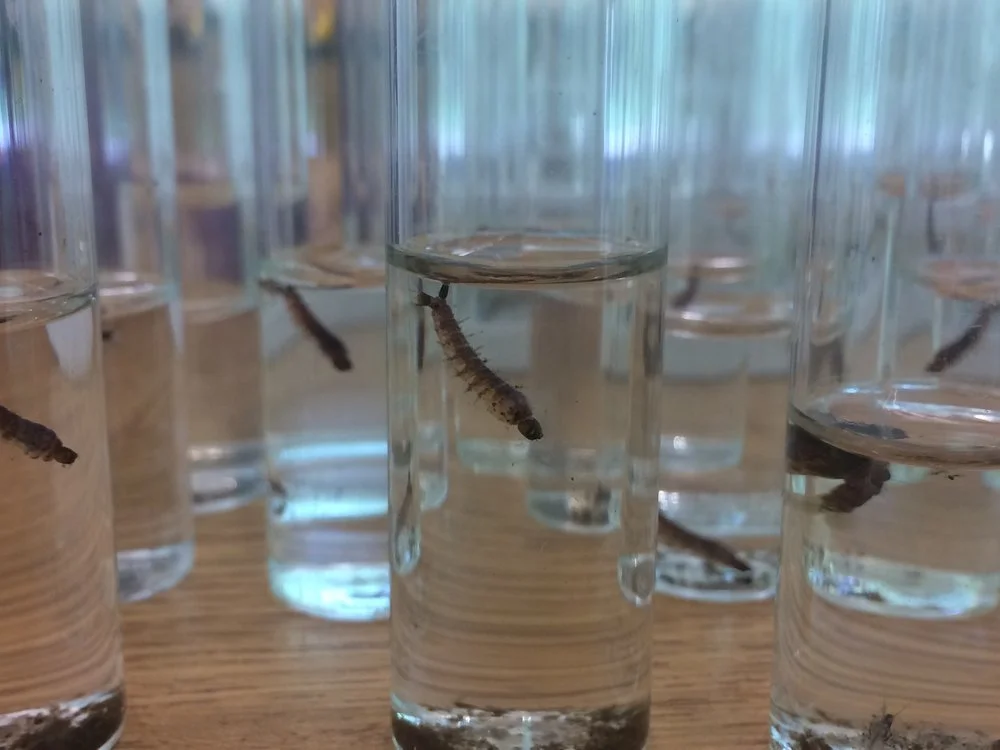research team mentors
Principal Investigator
Lauren Johnson, BS (Biology)
PhD Candidate, Ecology and Evolutionary Biology program
Washington University in St. Louis
Email: johnson.l.e@wustl.edu
Co-Principal Investigator
Katie Westby, PhD (Biology), MSPH
Vector/Disease Ecologist, Tyson Research Center
Lab website: katiewestbymosquito.com
StLUEE: Urban Ecology and Evolution Working Group
Email: kwestby@wustl.edu
Co-Principal Investigator
Kim A. Medley, PhD (Conservation Biology)
Director, Tyson Research Center
Lab website: Medleylabgroup.com
StLUEE: Urban Ecology and Evolution Working Group
Email: kim.medley@wustl.edu
Research focus for summer 2025
Mosquitoes have been pervasive elements of landscapes and human societies for millennia, causing severe disease outbreaks and influencing the outcomes of major conflicts. To understand how mosquitoes transmit disease, it is critical to understand their ecology and evolution – why mosquitoes and their pathogens are where they are.
Our lab is interested in how interactions between mosquitoes and their environment (abiotic and biotic) influence the geography, abundance, behavior and survival of mosquitoes from both ecological and evolutionary perspectives. We use a variety of tools to address basic and applied questions, and many of our projects combine lab- and field-based experiments.
Our projects for summer 2025 are focused on how light pollution impacts mosquito behavior.
Light is an essential biological signal for the world's flora and fauna. With widespread artificial lighting at night (ALAN) due to urbanization and human settlement, most flora and fauna are experiencing unnatural lighting signals that could impact their behavior and development. We have multiple studies and experiments aiming to understand how ALAN impacts the behavior and development of the invasive tiger mosquito, a dominant day-time active mosquito species in cities across the globe. For this summer in particular, we plan to focus on two specific projects/questions:
1) Is light pollution changing the activity patterns of the invasive Tiger mosquito?
For this project, we will measure the circadian locomotor activity of wild-caught adult mosquitoes across St. Louis using a FlyBox (methods outlined here). FlyBox is a light-tight 11-inch cube equipped with entrainment lights and video recording to detect real-time activity patterns of mosquitoes placed in multi-well plates. Last summer, we began engineering the FlyBox. This summer, we plan to troubleshoot video acquisition and programming different light cycles. For this project, you will learn how to collect mosquitoes in the field and run locomotion assays with the FlyBox. You will also learn how to analyze the image data we get from the FlyBox in MATLAB.
2) Is light pollution interacting with extreme heat to change the egg-laying (oviposition) behaviors of wild day-active mosquitoes?
In this project, we will assess daytime and night-time oviposition rates of wild populations of Tiger mosquitoes in St. Louis. However, we quickly realized that we needed specialized equipment to answer this question, so we partnered with the senior design engineering students at WashU to create a special programmable trap that allowed us to collect eggs across multiple sites at pre-programmed times. For this project, you will be instrumental in piloting and modifying the new trap. You will also learn how to collect mosquito eggs in the field, how to use temperature loggers, how to use imaging microscopes, and how to analyze images to count egg abundance.
Skills
techniques
methods
In our lab, we work to foster an inclusive and collaborative environment. We value the ideas our fellows and apprentices bring to the conversation and take our roles as mentors very seriously.
In addition to the skills you will gain on each project outlined above, you can expect to gain exposure to multiple aspects of the scientific process, including experimental design, collecting and curating data, analyzing and visualizing data using R, and science communication through slide deck presentations and scientific posters.
research conditions
Fellows can expect to split their time between field and lab work. The ratio will depend on the nature of the projects, but currently planned research will be approximately 25/75 field/lab. Field conditions can range from kneeling and sorting through larval mosquito habitats to hiking in rugged terrain to driving to field sites throughout the St. Louis region and collecting mosquitoes during the hottest part of the day.
Team structure and opportunities for individual research
As a member of the Mosquito Team, you'll gain hands-on experience in field and laboratory research by contributing to our ongoing studies on mosquito ecology and behavior. Early in the summer, you'll receive focused, day-to-day training and guidance (mainly led by Lauren) to build your skills and confidence. As the summer progresses, you'll have the opportunity to take greater ownership of your work, applying what you've learned with increasing independence. While mentors will step back from daily oversight, we’ll continue to provide support through weekly team meetings. These meetings will provide opportunities for check-ins, goal-setting, career skill-building, project guidance, and paper discussions. This structure is designed to help you grow as a researcher and develop the skills needed to work independently while staying connected to a supportive team. Each fellow will present a poster at the Tyson Summer Research Symposium at the end of the field season.
If interested, you will also be able to design and conduct an individual research project alongside your work on our ongoing research studies. You can expect to design your own study with our advice and guidance, collect and analyze your own data, and potentially publish your work in peer-reviewed journals. We also welcome students interested in conducting research that leads to a senior thesis. If you know you are interested in an honors thesis, please contact Dr. Kim Medley directly in addition to submitting your application so we can start this conversation early.











